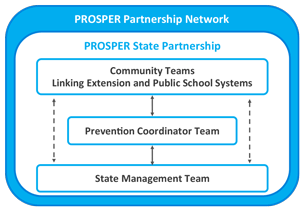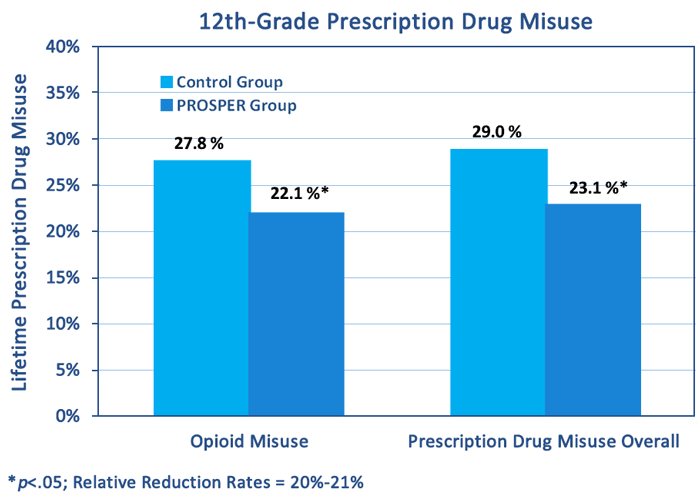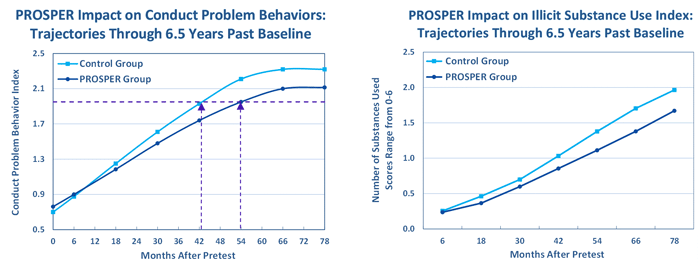PROSPER Partnerships
- Need: An approach to support sustained, quality delivery of evidence-based programs for youth and families in rural communities.
- Intervention: PROSPER, a program delivery system, guides communities in implementing evidence-based programs that build youth competencies, improve family functioning, and prevent risky behaviors, particularly substance use.
- Results: Youth in PROSPER communities reported delayed initiation of a variety of substances, lower levels of other behavioral problems, and improvements in family functioning and other life skills.
Evidence-level
Evidence-Based (About evidence-level criteria)Description
PROSPER (PROmoting School-Community-University Partnerships to Enhance Resilience) is an evidence-based program delivery system that was developed to test the feasibility of using small strategic teams to facilitate the delivery of other evidence-based programs in rural communities. The original randomized controlled PROSPER evaluation study began in 2001, with approximately 11,000 participating youth and their parents from 28 communities in Iowa and Pennsylvania.

PROSPER was designed to address the challenges most commonly faced by community-based program providers, such as difficulty with participant recruitment, maintaining high implementation fidelity, and sustaining the effort after initial funding sources are depleted. It uses the infrastructures of the Cooperative Extension System at the Land Grant University and the public school system to build local teams of 8-12 community stakeholders that oversee all aspects of program implementation. The PROSPER Network Organization is headquartered at the Partnerships in Prevention Science Institute at Iowa State University in Ames, Iowa.
The evidence-based programs on the PROSPER menu all emphasize building youth competencies, improving family functioning, and preventing risky behaviors, particularly substance use.

All Community Teams select a family-focused program such as the Strengthening Families Program: 10-14 (SFP 10-14) to offer to 6th graders and their parents. They also choose a school-based curriculum such as All Stars, LifeSkills Training, or Lions Quest-Skills for Adolescence to deliver in 7th grade classrooms.
In addition to the extension specialists and public school co-leaders, PROSPER Community Teams include representatives from human service agencies and local businesses, parents, and youth. These teams are supported by a multi-tiered, proactive model that includes technical assistance and support from PROSPER trainers and coaches. Community Team sustainability efforts include grant writing, soliciting in-kind donations and volunteer time, and other fundraising events.
This video describes how the PROSPER model works in schools and communities
Funding for research on PROSPER has come from the National Institute on Drug Abuse, the Centers for Disease Control and Prevention, and the Annie E. Casey Foundation.
Services offered
Although the programs chosen are delivered by community teams, the PROSPER Organization provides the following support services:
- Trainings for team members within the state's extension system
- Manuals that provide a standardized process for all phases of implementation, from team mobilization to sustainability
- Ongoing, proactive technical assistance throughout the implementation process
- Online reporting systems and assistance with monitoring implementation quality and partnership functions
- Evaluation of outcomes
There are 3 training units for team members:
- Unit 1 educates teams on their roles, organizational structure, the PROSPER approach, and long-term sustainability planning
- Unit 2 builds on the first training and teaches participants about selecting and implementing a family-focused program
- Unit 3 focuses on the selection and implementation of the school-based program, team development, and more advanced sustainability planning
Results
The PROSPER delivery system was evaluated with a longitudinal randomized controlled trial conducted in 28 rural communities (14 intervention and 14 control) across Iowa and Pennsylvania. Findings from this study indicated that PROSPER has a range of positive outcomes, including improved family functioning and parenting, delayed initiation of a variety of substances, and reduced conduct behaviors in youth. For instance, youth participating in programs implemented through PROSPER scored significantly lower on a number of negative behavioral outcomes, including drunkenness, cigarette use, marijuana use, use of other illicit substances, and conduct problem behaviors. Results extended up to 6.5 years past baseline (end of 12th grade) and, in many cases, higher-risk youth benefited more. Specific results are highlighted below:
- Reduction in gateway and illicit drug misuse
- Reduction in nonmedical, prescription opioid use
- Improved behavioral conduct in youths' actions like stealing, truancy, aggression
- Improvements in youth's attitude toward substance use, inductive reasoning, and overall assertiveness
- Improvements in general child management, child monitoring, harsh discipline, parent-child quality and activities, and family environment

PROSPER Community Teams were also very successful with family program recruitment and maintaining high levels of implementation quality. For example, Community Teams recruited 17% of all eligible 6th grade families into the SFP 10-14 during the first 2 years of implementation, compared to a 1 to 6% rate for most non-PROSPER programs. Implementation quality scores exceeded 90% for both school and family programs for the first 6 years of implementation. In the 2004-08 periods, all 14 PROSPER Community Teams continued to implement their programs with self-generated funds, averaging $20,000 per year. Only 2 teams did not reach the 10-year sustainability mark.
PROSPER has received awards and recognition from various groups across the country.
View PROSPER's Proven Results page, the BluePrints for Healthy Youth Development, their Multi-phased Development Process, and the articles below for more recent findings.
- Spoth et al. (2017) PROSPER delivery of universal preventive interventions with young adolescents: long-term effects on emerging adult substance misuse and associated risk behaviors. Psychological Medicine. 47(13), 2246-2259. Article Abstract
- Greenberg, M. T. et al. (2015). Factors that predict financial sustainability of community coalitions: Five years of findings from the PROSPER partnership project. Prevention Science, 16(1), 158-167. Article Abstract
- Spoth, R. L. et al. (2015). PROSPER Partnership Delivery System: Effects on Conduct Problem Behavior Outcomes Through 6.5 Years Past Baseline. Journal of Adolescence, 45, 44-55.
- Redmond, C., Spoth, R., Schainker, L. M., & Feinberg, M. (2015). The Partnership-Based PROSPER Delivery System and Implementation of the Strengthening Families Program: For Parents and Youth 10-14. In Van Ryzin, M., Kumpfer, K.L., Fosco, G. & Greenberg, M. (Eds.) Family-Based Prevention Programs for Children and Adolescents: Theory, Research, and Large-Scale Dissemination. NY. Psychology Press.
- Crowley, D.M., Jones, D.E., Coffman, D.L, & Greenberg, M.T. (2014). Can We Build an Efficient Response to the Prescription Drug Abuse Epidemic? Assessing the Cost Effectiveness of Universal Prevention in the PROSPER Trial. Preventive Medicine, 62. 71-77.
- Spoth, R., Redmond, C., Shin, C., Greenberg, M., Feinberg, M., & Schainker, L. (2013). PROSPER Community-University Partnership Delivery System Effects on Substance Misuse Through 6½ Years Past Baseline from a Cluster Randomized Controlled Intervention Trial. Preventive Medicine, 56, 190-196.
- Spoth, R., Trudeau, L., Shin, C., Ralston, E., Redmond, C., Greenberg, M., Feinberg, M. (2013). Longitudinal effects of universal preventive intervention on prescription drug misuse: Three randomized controlled trials with late adolescents and young adults. American Journal of Public Health, 103(4), 665-672. Article Abstract
Challenges
The following are typical barriers that community-based programs face when starting a new program. Knowing this, PROSPER developers took action to overcome these difficulties and equip community teams to successfully mobilize and sustain their efforts.
- Recruitment – PROSPER technical assistance providers encouraged Community Teams to use their existing networks and to personally contact potential participants in order to prevent low recruitment rates.
- Program fidelity – Technical assistance was provided to Community Teams on the relationship between fidelity and program outcomes, and PROSPER was designed to include continual monitoring of family and school program implementation quality.
- Sustainability – The goals of sustaining the team and the programming effort were introduced as priorities during the early stages of team development. Technical assistance focused on planning for ongoing implementation, building relationships with community stakeholders, and maintaining active team engagement.
Additional difficulties that have been experienced in states implementing PROSPER:
- Adaptations have been made to the implementation process due to downsizing, restrictions, staffing changes, and priority shifts of state extension systems.
- Turnover in key roles, such as a new team leader, can reduce the Community Team's productivity until a new team leader is trained and acclimated to the role.
- Decreases in federal and state extension funding sources have made it challenging for states to adopt PROSPER without outside grant funding.
Replication
The PROSPER team believes that providing training and technical assistance, sustainability planning, and offsetting initial programming costs are key to include in an effective program-delivery system. Other important factors include:
- Effective communication and engagement within the program-delivery system, including extension agencies, family-serving agencies, schools youth, and families.
- Learning the culture of the local community and the way in which the extension and school systems operate are imperative to building strong relationships.
- Sustainability comes from careful planning, fundraising efforts, and follow-through from the team. Families want to participate in programs that have a good reputation in the community and that are offered by reputable providers.
Topics
Behavioral health
· Children and youth
· Families
· Schools
· Substance use and misuse
· Wellness, health promotion, and disease prevention
States served
Iowa, Pennsylvania, Vermont, West Virginia
Date added
January 20, 2016
Suggested citation: Rural Health Information Hub, 2025 . PROSPER Partnerships [online]. Rural Health Information Hub. Available at: https://www.ruralhealthinfo.org/project-examples/880 [Accessed 14 February 2026]
Please contact the models and innovations contact directly for the most complete and current information about this program. Summaries of models and innovations are provided by RHIhub for your convenience. The programs described are not endorsed by RHIhub or by the Federal Office of Rural Health Policy. Each rural community should consider whether a particular project or approach is a good match for their community’s needs and capacity. While it is sometimes possible to adapt program components to match your resources, keep in mind that changes to the program design may impact results.

